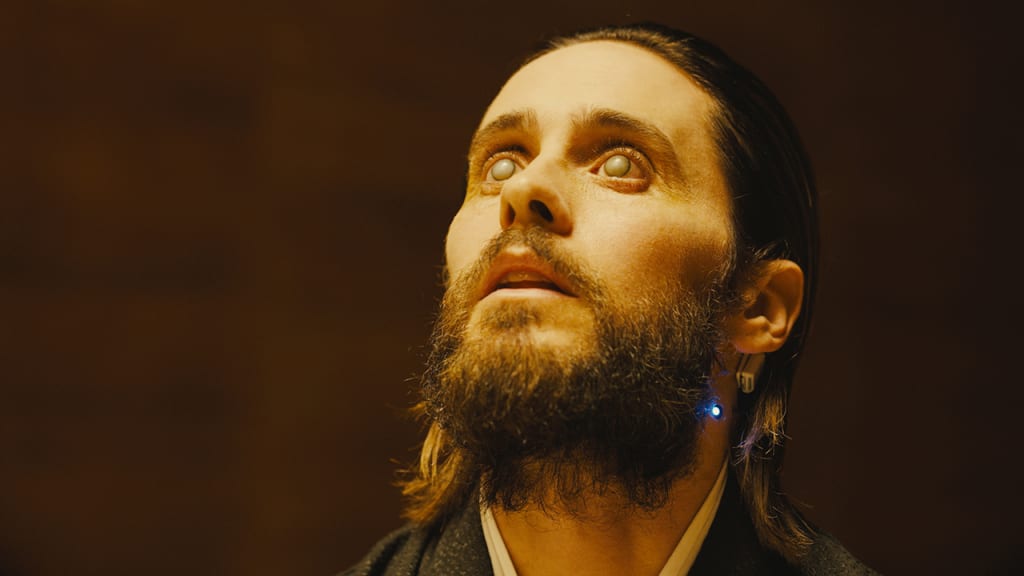'Blade Runner 2049' Has a Villain Problem and We Need to Talk About It
Really, did we actually see enough of Niander Wallace?

Not having a central villain can be sort of a problem. While the original Blade Runner is a science-fiction classic, the sequel Blade Runner 2049 amplified its concepts to new heights; Ridley Scott's 1982 sci-fi classic explored the fine line between humanity and artificial intelligence — and our relative perception of good and evil.
While some believed that Dr. Eldon Tyrell was the ultimate villain of Blade Runner because he created Replicants to begin with, others saw the rogue Replicant Roy Batty as a more standard antagonist. Some viewers even see Rick Deckard (Harrison Ford) as the true villain for hunting Replicants. This debate has blurred the lines for over 30 years — so, how does Blade Runner 2049 handle the villain issue?
Director Denis Villeneuve, along with screenwriters Hampton Fancher and Michael Green, stick to the original's ambiguous template. But was this the right way to go?
Does The Lack Of A Central Villain Hurt The Story?
It's essential in every story to have a solid protagonist and antagonist. (Even when the story falls into the "Man Against Nature" genre, then wilderness or weather serves as the obstacle to overcome.) It gives the viewer someone to root for, even though a well-written villain has strong, understandable motivations.
Going into 2049, viewers are led to believe that Niander Wallace (played by Jared Leto) was the story's main antagonist. After all, he's essentially the new version of Tyrell. The fact that Wallace eradicated world hunger gives the initial impression that maybe he isn't all that bad ... that is, until you find out his motivation is to allow his Nexus models to sexually reproduce and replace humanity throughout the galaxy.
But as far as villainous acts, Wallace takes a backseat to his Replicant assistant, Luv, who commits murder to further his plans. While the argument could be made that she is just obeying the orders of her master — thus making Wallace even more terrifying — it often feels as if she alone is responsible for her actions.
For example, Wallace starts strong by murdering a newborn Replicant in his first scene, but all subsequent acts of violence are carried out by Luv. It's like 2049 set us up to see how heartless Wallace was right from the beginning, but then we don't really see it again, only by proxy.
There's a real question of whether Luv is acting on her own free will; at times she doesn't seem 100 percent obedient like Nexus models should be. Similar to the comparison of Wallace to Tyrell, we could compare Luv to Batty. The intensity of Luv's actions overshadow Wallace's place as the main villain, similar to how Batty's quest for life overshadowed Tyrell in the original.
So, what about the "good guys"? Officer K, Lieutenant Joshi, Sapper Morton and even Rick Deckard exhibit moral shades of gray here. Some of their actions and underlying motivations ultimately make you question which side of the spectrum they truly are on, which further takes away from viewing Wallace purely as a Big Bad.
Does 'Blade Runner 2049' Give Jared Leto Enough Screen Time?
While you expect to see more of your protagonist overall, viewers also expect to see a hefty amount of screen time for the person they're supposed to be defeating. Blade Runner flipped this standard upside down by only showing Dr. Tyrell in two scenes, and 2049 follows the same path by barely showing Niander Wallace.
Essentially, this makes rooting for your protagonist a bit difficult, because you barely see what their main opposition is doing. After all is said and done, we see more of every other character than we do Niander Wallace.
This is incredibly strange given the dominance of the Wallace Corporation, and the influence that he holds over humanity. The also makes it more difficult for viewers to grasp how dangerous he is if they didn't watch the "2036: Nexus Dawn" short film prior to seeing 2049.
Final Thoughts?
Blade Runner 2049 is faithful to the ambiguity of the original Blade Runner, in which the Tyrell/Batty/Deckard dynamic gave us a story without a main villain. However, in 2049, we ultimately run into more problems because there is an increased number of characters and the story is more complex.
While I would personally say that we just saw enough of Wallace to get the overall idea of him, I feel like 2049 should have given him more of a focus. Luv feels like the primary antagonist simply because she has far more screen time, and goes up against Officer K in the climactic fight — until you consider whether she's just carrying out Wallace's orders, so is he the real villain? In the end, viewers are once again forced to evaluate the motivations of each character and make up their own minds.
As soon as you walk out of the theater, you'll have some major questions, and it's good that the film is making us ponder so many of its deep themes. However, I couldn't help but feel that we got cheated out of a strong villain. Niander Wallace had far more potential that could have been explored.
But then again, Wallace doesn't die and Luv does, so who knows what could happen if there's another installment of Blade Runner in the future?
About the Creator
Jenika Enoch
I love movies, music, sci-fi, and art. I'm a certified graphic designer and create my own art. Things that fuel me include equality, respect, and anything weird.






Comments
There are no comments for this story
Be the first to respond and start the conversation.